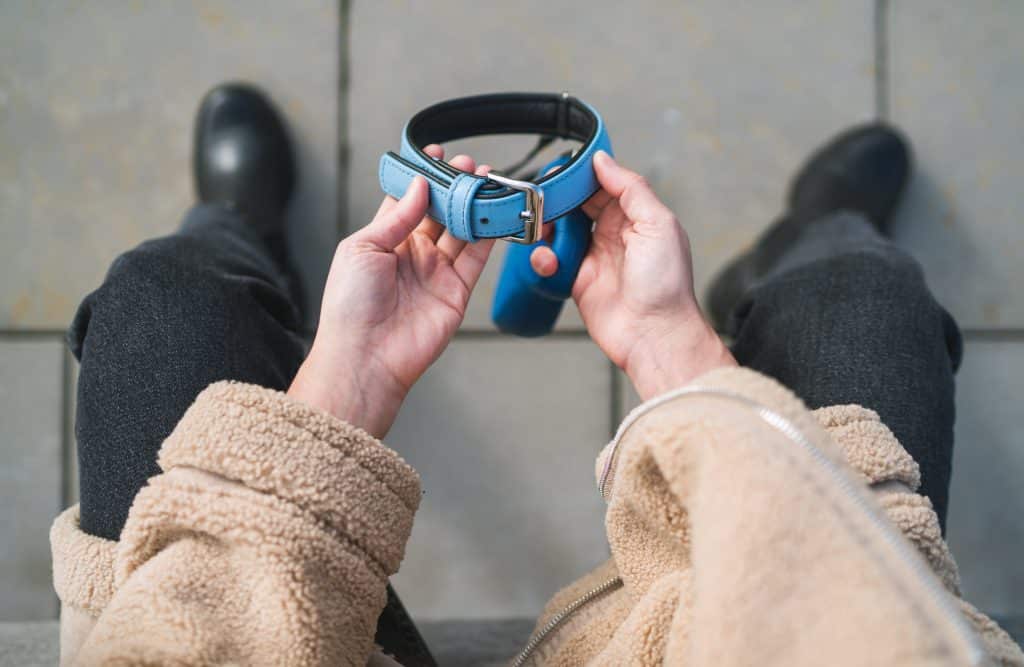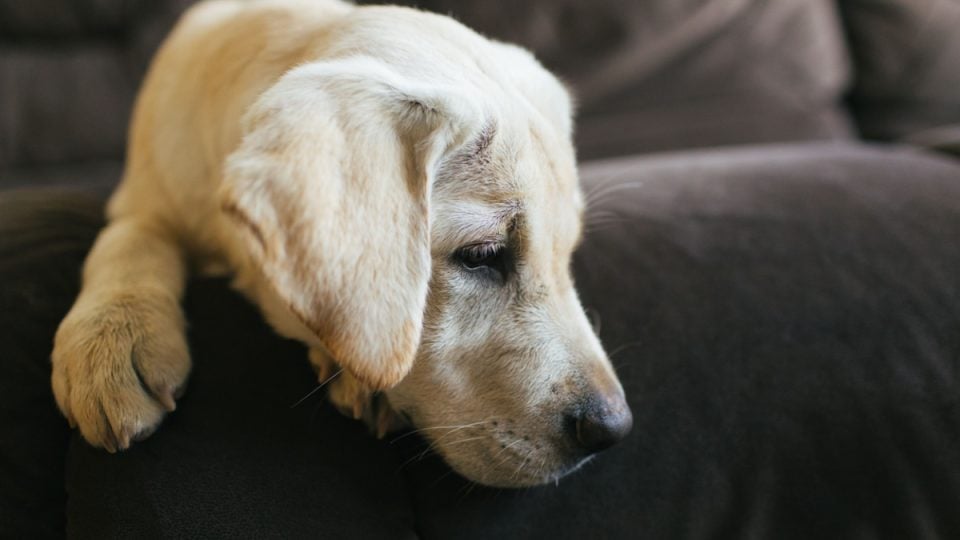- This post contains affiliate links. Read more here.
- Not a substitute for professional veterinary help.
Many pet parents will have seen their dog’s personality change after the loss of another canine or feline buddy. A large decline in personality or behavior, like not eating to not playing, can be a sign that a dog is grieving. If this change occurs after an animal or human is gone, it’s even more likely that your dog is mourning a loss.
“Differentiating between grief and separation stress can sometimes be challenging, as the two can share similar symptoms,” explains Dr. Kathryn Dench, a veterinarian with Gentle Dog Trainers.
Often, the impact of grief for dogs resolve after two to six months but Dr. Dench acknowledges that some dog may never be quite the same again. “Grief-related distress can last for an extended period, and in some cases, it might lead to long-term changes in a dog’s behavior or personality,” Dr. Dench says.
We can’t ask our dogs to explain their understanding of death, but knowing more about the likely ways that they do grieve can help pet parents support their dogs while you navigate this time of loss, together.
Signs of Grief In Dogs
Research has found that dogs may exhibit behavioral changes after the death of a canine companion, including:
- Increased attention seeking
- Reduced activity levels
- Sleeping more
- Increased fearfulness
- Increased vocalization
- Changes to eating habits
- Seeking out the deceased pet’s favorite spots
Every dog is an individual, so some may exhibit more signs of unhappiness than others. If you’re concerned about your dog’s behavior changes after losing a companion, speak to your veterinarian for advice.
Do Dogs Understand Loss?
“Dogs most certainly can grieve over the loss of a companion, whether that companion is human, canine, or another species,” says Dr. Sarah Reidenbach, CEO of Ruthless Kindness. “However, just like we see in people, grief can vary and can have many different behaviors.”
One study found that a dog’s behavior does change after losing a companion. Although how long dogs spent time together didn’t affect the behavioral changes, research found that a pet parent’s emotional state did. If you’re having a hard time adjusting to the loss of another pet, your dog may pick up on this too.
“Dogs are certainly capable of sensing the absence of a loved one,” says Dench. “They pick up on changes in routines, scents, and the emotional atmosphere, which can contribute to their understanding that someone or another pet is no longer present.”
Many pet parents are also worried about whether they should let the remaining dog see the body of their deceased companion—but this study found there was no difference in behavioral changes between pets that were offered this option and those that weren’t.
Do Dogs Understand Death of a Human?
There’s certainly anecdotal evidence that dogs mourn their human companions. “We’ll probably never know exactly how a dog perceives death. But we do see some distinct differences between how dogs and humans respond to death and loss,” says Dr. Reidenbach. “Dogs usually don’t hold onto stress. They are experts at ‘shaking it off’ and moving on from traumatic events.”
Dr. Reidenbach explains that the behavior changes in dogs after losing a human can vary from one end of the spectrum to the other. “They may sniff around or look for a lost companion, then move on without much impact. [Or] dogs may feel lost or lonely, and their routine and behavior will change greatly,” she explains.
Famous example of grieving dogs
We’ll warn you ahead of time—these are real tearjerkers.
- Hachiko: this white Akita Inu walked to a local train station every day for ten years, waiting for his deceased owner to return. There’s now a statue in his honor at the train station, and his story inspired the film ‘Hachi: A Dog’s Tale.’
- Greyfriars Bobby: either a Skye Terrier or Danidie Dinmont Terrier, Greyfriars Bobby spent 14 years guarding his deceased owner’s grave in Edinburgh, Scotland. Greyfriars Bobby died in 1872 and has been immortalized by a commemorative statue.

Image credit: Solovyova | iStock
How to Help A Grieving Dog
It’s important to be observant of your dog if they lose a friend—which can be difficult when you, too, are grieving the same loss. We spoke to Emma Thompson, dog behaviorist with The Animals Post, and Jessie Kasper, behavioral trainer and owner of Mindful Methods Companion Coaching for advice.
1. Keep active
“Gradual daily exercise, play sessions, training, and affection can all help dogs feel secure as they slowly accept their new normal,” says Thompson.
2. Rule out medical issues
Behavioral changes like decreased activity, changes to eating habits, and increased vocalization might also be due to medical issues, so it’s worth making an appointment with your veterinarian to rule this out.
3. Maintain a routine
“Establishing predictable routines right away is paramount such as consistent feeding, sleeping (times AND areas it is offered), play, walks, and so on, to help the dog settle in faster and ease anxiety,” says Kasper.
4. Make time for sleep
Kasper says regular sleep is one of the most beneficial things any species can be offered when it comes to recovering from a stressful event. Make sure your dog has somewhere safe and secure they can retreat to whenever they need.
5. Offer your dog a reminder of their lost loved one
If your dog wants to sleep in their friend’s bed or seems attached to their blanket or toy, consider leaving it with them rather than removing it right away. In the case of a human loss, they may want to sleep with an item of clothing.
6. Be spontaneous
Finding fun ways to spend time with your dog can help, suggests Kasper. “Increasing enrichment through puzzles, simple training exercises, playing with your dog, or taking a sniff walk to decompress in nature,” says Kasper.
Some dogs may also enjoy a ride in the car, maybe even stopping off at the drive-through for a fun treat like a puppuccino or plain hamburger. While these foods might not be the healthiest treat for our dogs, they’re fine as a rare experience.
6. Get support from a trusted pet caregiver
Unfortunately, our busy lives need to continue even during periods of mourning. If you need to get back to work, hiring a loving pet sitter or a dedicated dog walker is a great way to help offer your dog companionship or keep them active—and give yourself some peace of mind.
7. Wait to get a second dog
It might be tempting to add a new pet to your family right away—but it’s usually better to wait. Kasper mentions that getting a new dog is another upheaval to your existing dog’s routine, and can end up feeling very chaotic for them.
8. Consider training
“Engaging with your dog one-on-one simply through training can have profound effects on a dog’s quality of life and general outlook,” says Kasper. To develop new routines and habits, Kasper recommends looking for a trainer who specializes in behavior modification.
Take Care of Yourself Too
Sometimes a dog’s grief will mirror the humans in the household. If you are experiencing difficulties grieving, the loss of a pet consider a support group.
Online support groups like Grieving My Pet are somewhere to share stories as you process your grief. Your veterinarian or local humane society may also be able to recommend local pet loss support groups. They may also have additional suggestions for helping your other pets with their mourning.
Be patient with yourself and your pet as you both grieve. Life will change for both of you after losing another pet, but spending time together can help you both adjust and adapt, together.



